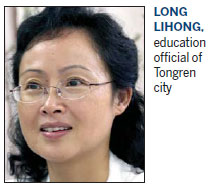
The success of Tongren, Guizhou province, in promoting preschool education in rural areas is being hailed as a possible blueprint for the eradication of poverty and a means of preventing its reemergence.
Seven of the 12 county-level regions in Tongren have been designated by the government as national-level poverty-stricken counties. In 2013, the average per capita income for farmers in the city was 5,397 yuan ($780; 736 euros; 642), 40 percent lower than the national level that year.
Initiated in 2012 by the China Development Research Foundation and Songtao Miao autonomous county in Tongren, the Mountain Village Kindergarten Project has built 2,000 facilities for rural preschoolers. One-hundred percent of the communities are served today, up from just 10 percent in 2013.
Long Lihong, director of the Tongren City Education Commission, said most of the facilities are located in unused primary school classrooms, in village committee offices or in houses, instead of building new kindergartens. But kindergartens were built in every place where it could be guaranteed that more than 10 children would enroll.
|
Children take a post-lunch nap at the Muziping Village Kindergarten in Tongren. Photos by Hou Liqiang / China Daily |
|
Shi Jiahui, 3, eats lunch at the Houzhai Village Kindergarten in Tongren, Guizhou province. |
In Houzhai village, three unused primary school classrooms were transformed into a kindergarten for 27 preschoolers from a nearby Miao ethnic community of 1,400.
Tongren's total revenue was 37.9 billion yuan from 2011 to last year. Since 2012, the city government has allocated 5 percent of its annual administrative budget to the kindergarten project. District governments are rewarded with 10,000 yuan for every facility they establish in the mountains, and the city government allocates 300 yuan per year to every child for teaching materials.
"Many kids in the rural areas are left-behind children. They are cared for by their grandparents, who are usually poorly educated and unable to do much for them," Long said. "We have seen great improvements in the children's linguistic skills, cognitive competence and memory capacity since they entered the kindergartens."
According to tests conducted by East China Normal University in Tongren, the language competence of children aged 4 to 5 improved by 23 percent after spending a year to 18 months at a kindergarten, while cognitive competence improved by 27 percent and memory improved by 34 percent.
The children's behavior and hygiene also improved.

Long Jiawei, 4, and her sister Long Jiali, 6, have lived with their grandmother, Shi Qingjiao, since 2015, when their parents moved east to Zhejiang province for work. Shi, 75, has rheumatism and says all she can do for the girls is cook food and wash their clothes.
"My granddaughters' awareness of hygiene has changed a lot since they started at the kindergarten. Now, they ask to change their clothes and have showers every day. They say they can't fall asleep if they don't take a shower," Shi says.
It will take about 20 years for the full impact of the project to be seen, but education is an important way of eradicating poverty, Long, the education director, says. "In poverty-stricken areas such as Tongren, it's key for people to make their way to colleges or universities to eradicate poverty."
"In addition to occupational and compulsory education," she added, "importance should also be attached to preschool learning, so we can build up the talent pool and save future generations from poverty."
Contact the writers through houliqiang@chinadaily.com.cn
(China Daily European Weekly 03/31/2017 page8)